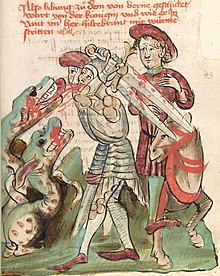
Dietrich von Bern is the name of a character in Germanic heroic legend who originated as a legendary version of the Ostrogothic king Theodoric the Great. The name "Dietrich", meaning "Ruler of the People", is a form of the Germanic name "Theodoric". In the legends, Dietrich is a king ruling from Verona (Bern) who was forced into exile with the Huns under Etzel by his evil uncle Ermenrich. The differences between the known life of Theodoric and the picture of Dietrich in the surviving legends are usually attributed to a long-standing oral tradition that continued into the sixteenth century. Most notably, Theodoric was an invader rather than the rightful king of Italy and was born shortly after the death of Attila and a hundred years after the death of the historical Gothic king Ermanaric. Differences between Dietrich and Theodoric were already noted in the Early Middle Ages and led to a long-standing criticism of the oral tradition as false.
Legends about Theodoric may have existed already shortly after his death in 526. The oldest surviving literature of various Germanic-speaking peoples mentioning the hero Dietrich von Bern, includes the Old English poems Widsith, Deor, and Waldere, the Old High German poem Hildebrandslied, and possibly the Rök runestone. The bulk of the legendary material about Dietrich/Theodoric comes from high and late medieval Holy Roman Empire and is composed in Middle High German or Early New High German. Another important source for legends about Dietrich is the Old Norse Thidrekssaga, which was written using German sources. In addition to the legends detailing events that may reflect the historical Theodoric's life in some fashion, many of the legends tell of Dietrich's battles against dwarfs, dragons, giants, and other mythical beings, as well as other heroes such as Siegfried. Additionally, Dietrich develops mythological attributes such as an ability to breathe fire. Dietrich also appears as a supporting character in other heroic poems such as the Nibelungenlied, and medieval German literature frequently refers and alludes to him.
Poems about Dietrich were extremely popular among the medieval German nobility and, later, the late medieval and early modern patrician classes, but were frequently targets of criticism by persons writing on behalf of the church. Though some continued to be printed in the seventeenth century, most of the legends were slowly forgotten after 1600. They became objects of academic study by the end of the sixteenth century, and were revived somewhat in the nineteenth and twentieth centuries, resulting in some stories about Dietrich being popular in South Tyrol, the setting for many of the legends. In particular, the legend of Laurin has continued to be important there, with the Rosengarten group of mountains associated with the legend.